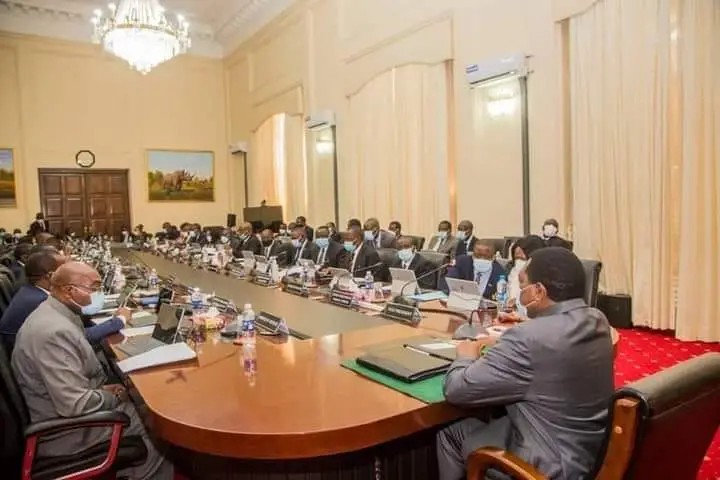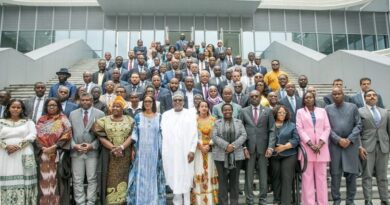2024 Second Cabinet Meeting
The President of the Republic of Zambia, Mr. Hakainde Hichilema, in his continued effort to improve the general living standards of the people, through putting in place appropriate policy and legislative frameworks, called for the 2nd Cabinet Meeting in the Year 2024, on Monday, 29th January, 2024, at State House.
Cabinet made the following decisions:
1. National Security Strategy.
Cabinet approved the first-ever National Security Strategy for Zambia, which comprehensively aims at addressing risks, threats and challenges to national security.
Over the years, Zambia has been a peaceful country. The country has enjoyed relative peace and security from internal and external threats. It has often been referred to as a beacon of peace on the African continent in particular, and the world in general.
The National Security Strategy is, therefore, an important framework that is expected to broaden the focus of the country’s national security beyond maintaining peace, to a more comprehensive national security that assures citizens freedom from fear, including economic, health, food, environmental, personal, community and political security, as well as the defence of the territorial integrity and sovereignty of the country.
2. The National Cooperatives Development Policy.
Cabinet also approved the Revised National Cooperatives Development Policy, in order to provide the context for the promotion and development of cooperatives for enhanced job and wealth creation across the country. For Zambia, many years ago, the Cooperatives were once the third largest employer in the country after Government and the mining sector respectively.
Cabinet is of the view that with the creation of the Ministry of Small and Medium Enterprises Development by the New Dawn Administration, it is just appropriate that the Cooperatives Policy addresses the Vision of the Government because the Cooperatives Movement remains a critical player in the development of the country. The Policy is expected to contribute to economic transformation of the country by emphasising the re-orientation of cooperatives into contemporary business models.
3. The National Youth Policy.
Cabinet also approved the Revised National Youth Policy, in order to address the challenges facing the youth in the country, such as high unemployment levels, limited access to factors of production, inadequate skills, drug, alcohol and substance abuse amongst others.
The implementation of the Revised National Youth Policy will address the gaps in the previous Policy, and thereby promote entrepreneurship, empowerment and job creation, and enhance coordination, implementation and monitoring of youth empowerment programmes, in line with the New Dawn Government’s policy direction of engaging the youth in national development matters. The implementation of the Policy, going forward, is expected to further spur economic transformation among the youth, thus optimising their full potential.
4. Legislative Matters:
(a) The Immigration and Deportation (Amendment) Bill, 2024.
Cabinet approved in principle, the amendment of the Immigration and Deportation Act No. 18 of 2010. This is in order to, among others, provide for the inclusion of Border Guards as part of personnel in the Immigration Department as well as alignment of the law with new developments in migration governance.
Some of the challenges experienced include mixed migration flows, human trafficking, smuggling of persons, long porous borders and asymmetrical migration. These challenges, therefore, require interventions that the current law does not provide for. It is in the interest of Cabinet to ensure that border governance has adequate human resource, social amenities, including improved infrastructure in order to effectively manage the long and porous international borderline.
Therefore, amending the Act will address the hinderances the Department is currently facing in effectively and efficiently discharging its mandate and enhance migration governance.
(b) The Zambia Police (Amendment) Bill, 2024.
Cabinet also approved in principle, to amend the 1966 Zambia Police Act, Chapter 107 of the Laws of Zambia, in order to include provisions that will strengthen the administration and enforcement mechanisms and bring it in line with other related pieces of legislation in the country.
Although numerous reforms relating to the operations and administration of the Zambia Police Service have taken place over the years, including changes in the environment in which the Police operate, the legal framework has not been amended to bring on board the desired changes that will make the Police more efficient and effective.
Therefore, the amendment of the Act will enable the Zambia Police Service to efficiently and effectively align itself and its functions to the Government’s Vision of running the affairs of the country based on the rule of law. It will also enable the Service to enhance its relationship with communities in fighting crime.
(c) The Zambia Institute of Banking and Financial Services Bill, 2024.
Another legislative matter approved by Cabinet in principle is the introduction of a Bill in Parliament to provide for the legal framework on the establishment of the Zambia Institute of Banking and Financial Services, in order to facilitate the incorporation of the Institute under an Act of Parliament.
This Bill was tabled before Parliament in November, 2022, however, during the Committee Stage, the Bill was withdrawn to allow for further consultations. It was also later realised that the draft Bill had some clauses that had the potential to conflict with the provisions in the Bank of Zambia Act and the Banking and Financial Services Act of 2017. After wide consultation, the Government is now ready to take the Bill to the National Assembly for enactment into law.
(d) Zambia National Building Society (Amendment) Bill, 2024.
Cabinet also approved in principle to the introduction of a Bill in Parliament to amend Section 130 of the Building Societies Act, Cap. 412, in order to align the Society’s financial year to that of Government.
The financial year of the Society under the current legislation is not in line with that of Government. As such, it is important to amend Section 130 of the Building Society Act in order to align it to that of Government and re-define certain definitions to also align them to the Government business cycle. Further, the amendment is also expected to re-align the Building Society’s planning and budgeting cycle with other Government institutions, thereby enhancing financial coordination and efficiency with funding agencies.
(e) Companies (Amendment) Bill, 2024.
Cabinet further, approved in principle to the introduction of a Bill in Parliament to amend the Companies Act, No. 10 of 2017. The objective of the proposed amendment is to enable compliance with the requirements of Recommendation 24 of the Financial Action Task Force (FATF), in order to resolve the deficiencies identified during the mutual peer review, which if left unresolved, may result in the Country being grey-listed by FATF.
Being grey-listed means that Zambia would among others, have reduced access to international finance, negative perception, negative impact on foreign direct investment and higher financial transaction costs. The FATF is an inter-governmental organisation that develops and promotes policies to combat money laundering and terrorist financing.
5. International Affairs Matters:
(a) Ratification of the Southern African Development Community (SADC) Protocol on Industry.
Other matters deliberated and approved by Cabinet are issues pertaining to Protocols and Agreements. Cabinet approved the ratification of the SADC Protocol on Industry, in order to promote the development of diversified, innovative and globally competitive regional and national industrial bases to enable the Region to achieve sustainable and inclusive industrial development.
The SADC Council of Ministers, during its meeting held from 14th to16th August, 2019, in Dar es salaam, Tanzania, approved the Protocol on Industry, and recommended it to the Summit for final approval and signature.
The Summit endorsed the Protocol and it has since been signed by Fourteen (14) Heads of States and Government. Following the signing of the SADC Protocol by His Excellency the President Mr. Hakainde Hichilema, in August, 2023, Zambia is now required to ratify the Protocol.
The Protocol is expected to strengthen Zambia’s integration within the SADC region and facilitate the development of common industrial policies and regulations which would result in reduced technical barriers to trade and attract Foreign Direct Investments through increased access to larger markets and benefit from economies of scale.
(b) Ratification of the Agreement on the Southern African Development Community (SADC) Protocol on Statistics.
Cabinet also approved the ratification of the SADC Protocol on Statistics in order for Zambia to align her National Statistical Strategies to regional, continental and international statistical strategies for the development of statistics.
The Protocol was adopted at the SADC Summit held in August, 2021. The Protocol will only be effective once two-thirds of the sixteen (16) Member States have signed and ratified it. The Protocol will enhance the country’s compliance to minimum standards on quality and transmission of statistics in standardised formats.
6. National Financial Inclusion Strategy II (2024 – 2028).
Cabinet also approved the National Financial Inclusion Strategy II (2024-2028), in order to build on the progress achieved during the implementation of the previous strategy and address the identified challenges and gaps aimed at increasing access to finance for the Micro, Small and Medium Enterprises and the rural and underserved populations.
The National Financial Inclusion Strategy II is, therefore, Government’s renewed commitment to addressing the existing challenges and gaps, as well as setting the strategic roadmap to achieve 85 percent financial inclusion in the next five years.
The Strategy is in line with the aspirations of the Eighth National Development Plan and is one of the key ingredients in fostering the attainment of the Vision 2030 of becoming a middle-income nation.
7. Hosting of the African Trade and Investment Development Insurance (ATIDI) Corporation 24th Annual General Meeting of the Shareholders.
Cabinet has continued to ensuring that the country hosts a number of regional and international conferences and meetings as a way of promoting tourism. One such meeting is the African Trade and Investment Development Insurance 24th Annual General Meeting of the Shareholders, which will be held from 19th to 21st June, 2024 in Livingstone.
At the 23rd Annual General Meeting held from 5th to 7th July, 2023, in Rwanda, it was resolved that Zambia hosts the upcoming 24th Annual General Meeting, and Zambia agreed to this resolution in principle.
The meeting is expected to be attended by more than 400 VIPs and delegates from member countries and other institutional representatives.
8. Appointment of Members of the Lands Tribunal.
In winding up debate for the day, Cabinet approved a seven (7) member Lands Tribunal, in accordance with Section 5 of the Lands Tribunal Act, No. 39 of 2010, to hear and determine disputes relating to land matters.
The Lands Tribunal was established under the Lands Act of 1995. Subject to the Constitution, the Tribunal shall have jurisdiction to hear and determine disputes relating to land and in particular, to inquire into and make awards and decisions in any disputes relating to land under the Lands Act, Lands and Deeds Registry Act, Housing (Statutory and Improvement Areas) Act or any other law and hear and determine appeals against a direction or decision of a person in authority relating to land under the Lands Act, Lands and Deeds Registry Act, Housing (Statutory and Improvement Areas) Act.
The tenure of office for the previous members of the Tribunal expired and therefore, there is need to appoint new members to sit on the Lands Tribunal so as to enhance delivery of services and uphold the rule of law.
Hon. Cornelius Mweetwa, MP
MINISTER OF INFORMATION AND MEDIA AND CHIEF GOVERNMENT SPOKESPERSON
Source: Ministry of Information and Media – Zambia



